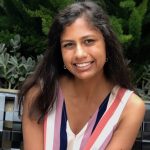Longitude Sound Bytes
Ep 53: Test yourself often | Ogonna Nnamani Silva – by Shvetali Thatte (Listen)
My name is Shvetali Thatte, a Longitude fellow from Case Western Reserve University. And today I will be presenting a sound byte by Ogonna Nnamani Silva, a former Olympic medalist, and a recent med school graduate. Ogonna will be speaking to us about the value of testing oneself often as a means of preparation, and she reflects on her own experiences to explain how this strategy lifts the pressure off during a time of actual performance or decision making.

Ogonna Nnamani Silva, Olympic medalist and UCSF Medical School graduate:
I love volleyball because it’s a true team sport. I was hooked. I said, this is what I’m gonna try and do. I was fortunate to go out to Stanford and compete for four years. And that’s how I started really getting into volleyball and Stanford’s a great place for academics too. And I was very determined to try and take full advantage of the resources available at a university like Stanford and it’s hard at times to balance being a student athlete. I told myself, hey, my body can’t go forever. And so I’m going to really try and give myself the best shot I possibly can at making the 2004 Olympic team. So I was fortunate to make that team. It was a tough decision to make because I had to take a leave of absence from school, which is something that is very scary to do. But I’m glad I did, because I learned so many lessons in that training camp. And I was fortunate to make the team and then I was lucky to play in another Olympics in 2008. I loved it and was trying for 2012. But I kind of had a reality check. I’m like, I’m gonna be 30 soon. And I really want to be a doctor. That’s my ultimate life goal. I really had to sit myself down and ask myself, what did I want to do with my life. And it was a tough call, I was traveling with the national team, I love it. I loved my teammates. I loved the coaches. I loved being there. So it’s really hard to be on the train and on a track that’s moving with no real issues, and get yourself off of the track and feel like you’re going on the wrong track in the wrong direction, and a completely new world. But I said, you know, I’m gonna try it.
There are so many times in my career where I never thought that medicine would be possible, so many roadblocks, like not being able to transfer my credits, not being able to get to the program right away. I always thought that my dream would continue. I was really bold, and I was determined.
Funny, I laugh and I always want to share this with people because everybody looks on LinkedIn. And people see resumes and people don’t understand that there are so many squiggly lines in between those points. It seems like it was a cookie cutter path for many but a lot of the times, things don’t go the way you had hoped that they would. But as long as you have a North-star and a mission, and an ultimate goal, you’ll eventually get there. You might not get there the way you had planned or hoped. But eventually you will make it.
I was fortunate to have played for Karch Kiraly, who’s currently the head coach of the women’s national volleyball team. He’s phenomenal. So he was one of the first people I reached out to when I made it to medical school. And I was like, Oh my gosh, I’m gonna start. And he shared a really important book with me, it’s called Make It Stick. And it’s such a good book. And I think, especially for someone like me, because a lot of times as athletes, you want to prepare and you want to practice before you start, do game like things before you compete, you always feel like you’re not ready, but always testing yourself. So game like situations, test like situations are invaluable experiences. And those help you to learn, to retain the information, putting yourself in those very similar high-pressure situations are actually very important. So I had my highlighter set picked out. I had my notebooks picked out and he reminded me the importance of you know, the essential principles of that book is a test yourself often. And then the first day of medical school class, I’m not joking, I was terrified. And the first slide of medical school is the slide of book, Make It Stick that was a really big symbol for me that I’m going to be okay.

Shvetali Thatte, Longitude fellow, Case Western Reserve University:
Thank you so much for such a lovely reflection, Ogonna. As someone who plans to go into the medical field, I felt inspired by your story. And I have so much respect for your commitment to both the sport you love and the field of medicine. I’ve always considered myself a competitive person. And I spent the greater part of my childhood competing in chess and karate tournaments on the weekend, so I became well accustomed to making decisions under pressure. However, I often forget the same principles of practice, practice and more practice, that apply for sports also play a role in school and in our careers. It really resonated with me when you talked about the idea of testing ourselves often, even with schoolwork, so that we can prepare ourselves for the performance we will have to give on our exams. In medicine, I can see this lesson being all the more important. As the more practice we do, the more confidently we can treat our patients. Like you said, there’s not one path to reach a final destination. And as long as you keep your North Star in sight at all times, you will find a way to get to your final destination, no matter how long it takes.
On that note, we’re out of time. But we hope you enjoyed today’s segment and felt inspired to continue your journey towards your own North Star.
Please feel free to share your thoughts over social media and in the comments, or write to us at podcast@longitude.site. We would love to hear from you.
Join us next time for more unique insights on Longitude Sound Bytes.
